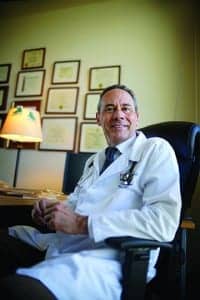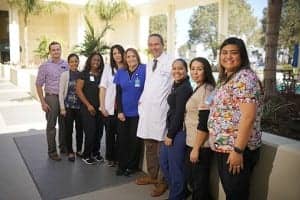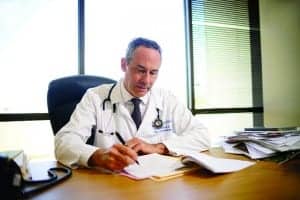How a designation helps J. Steven Poceta, MD, of Scripps Clinic treat patients with restless legs syndrome who have nowhere left to turn.

J. Steven Poceta, MD, began working at Scripps Clinic in 1987. As the only neurologist at the sleep center at the time, patients with the neurological sleep disorder restless legs syndrome typically gravitated to him.
Considering the shortage of neurologists in the United States,1 it seems contradictory for a physician in that specialty to actively light a beacon to attract additional patients. But for J. Steven Poceta, MD, of Scripps Clinic Viterbi Family Sleep Medicine Center in La Jolla, Calif, established restless legs syndrome (RLS) patients made a compelling case: Dr Poceta should alert other RLS sufferers that treatment for the neurological sleep disorder—even severe cases—is available at Scripps Clinic. “So many patients with RLS a) suffer without anyone to really help them and b) are passionate advocates for the condition,” he explains.
So in 2016, the 8-bed sleep center became certified as a Quality Care Center by the Restless Legs Syndrome Foundation, a designation recognizing its expertise and leadership in diagnosing and treating RLS. The clinic is staffed by 5 physicians who specialize in sleep medicine, neurology, chest medicine, cognitive behavioral therapy, and pulmonary medicine. In addition to Dr Poceta, two physicians are RLS experts (based on their specialized training and experience treating patients). The Scripps Clinic is one of 11 certified RLS Quality Care Centers worldwide, as of press time, and one of only two in the United States west of the Rocky Mountains. And so the patients’ hopes quickly became a reality: RLS sufferers from beyond state and regional borders began navigating themselves to Scripps.
Fascination with RLS
When Dr Poceta began working at the Scripps Clinic in 1987, he was the only neurologist among pulmonologists, psychologists, and other non-neurologist sleep specialists. “So all the neurological sleep disorders gravitated to me, and I developed a lot of experience with restless legs patients,” he says. “I thought it was a fascinating disorder in so many ways, particularly related to the fact that its feelings are gone in the daytime but come on strong at night. It also fascinated me that the medications that treat Parkinson’s disease also treat restless legs; that’s an interesting pharmacological aspect.”
He acquired more RLS experience in 2004 when Scripps became one of the institutions at which the clinical trials of gabapentin enacarbil for RLS were conducted.2 “It was really great to be at the start of an idea: to observe drug development from the beginning and be involved in that process, from the very beginning to it being approved,” he says of the medication now known as Horizant. “My involvement in the long-term development is something I am proud of.”
He is currently embarking on two new research projects. One will study hypnotics and whether abnormal behaviors (such as sleep driving) are more common in RLS patients than in others; the second asks whether people with RLS who develop addictive behavior on dopamine agonists also have tendencies toward drug and alcohol addiction.
Patient Advocacy

The team at Scripps Clinic Viterbi Family Sleep Medicine Center work together to provide quality care to patients with sleep disorders.
Caroline Chamales is one of Dr Poceta’s RLS patients and the founder and support group leader of the Restless Legs Syndrome Foundation’s San Diego RLS Support Group, which meets at Scripps. She is also one of the patient advocates who urged him to pursue the Quality Care Center designation. “I am originally from Chicago and moved here from New York City. I have seen the top neurologists in both places. But I have never seen anyone who knows as much about RLS as Dr Poceta,” Chamales says. “In addition to his knowledge, he is tireless in his efforts to help his patients find relief.”
When Chamales moved to San Diego about 7 years ago, there wasn’t an RLS support group in the area; the closest was in Los Angeles, at least 2 hours away. After determining there was interest in a San Diego-based support group, Chamales asked Dr Poceta if he’d be its medical advisor. “When he immediately agreed, I knew we had the foundation for a strong group in San Diego,” she says.
Dr Poceta and his assistant Denise Palmer obtained approval to have the meetings at Scripps. “We started our group with 3 people….We now have over 150 in our San Diego support group,” Chamales says.
The group hosts outside speakers at large semi-annual meetings as well as sharing ideas among members at smaller group meetings without formal speakers. “Because RLS is little understood, it is so helpful for those of us who are suffering to share ideas and give support to one another,” Chamales says. “Knowing we are not alone is very comforting. Being understood is everything when one is suffering.”
Patients Find Scripps
The RLS patients who find Dr Poceta as a result of Scripps’ Quality Care Center designation have some differences from the center’s previous patient population. “I have noticed the patients who come because they Googled ‘restless legs’ or Googled the RLS Foundation and saw the Scripps Clinic named there tend to be the more difficult cases or they live in areas where there isn’t good care,” he says. This is in contrast to most existing patients, who tend to live nearby and be referred by a local physician.
“People come to me from all over the world,” he says. “A lot of doctors know how to treat RLS on a ‘101’ level, but when the patients are complicated, there aren’t enough doctors who really know the condition.” Indeed, when asked if anything surprised him about the process of Scripps becoming a Quality Care Center, he responds, “I was a little surprised by how much need was out there.”
Telephone follow-ups are utilized so far-flung patients don’t have to continually drive or fly back to La Jolla. But if medication is prescribed, patients are required to return for in-person follow-ups; once a successful treatment is identified, follow-ups can be conducted by patients’ local physicians (as long as the prescribed therapy remains efficacious).
His advice to other clinicians considering applying for the Quality Care Center designation is to ensure they have strong support teams. Support staff is particularly important in cases in which patients with augmentation—RLS symptom worsening that can occur during treatment with dopaminergic drugs—need to change medications. In Dr Poceta’s case, two of the center’s nurses have proved invaluable. “Coming off dopamine agonists is difficult medically and very difficult psychologically. People often get worse before they get better,” he says. “It helps greatly to have nurses who know the medicines and can handle the phone calls on days 3, 7, and 14.”
Healthcare Provider Education

Support staff is particularly important in cases in which patients with RLS augmentation need to change medications.
RLS is frequently treated at the primary care physician level, which Dr Poceta says works well in most cases of mild to moderate symptoms, presuming the physician is educated about the disorder. “Restless legs has a relatively small number of medications and is a relatively easy diagnosis to make,” he says.
But a baseline level of education is key. For clinicians who want to increase their expertise, he recommends joining the International Restless Legs Syndrome Study Group, downloading publications from the Restless Legs Syndrome Foundation, and attending RLS-focused sessions at the annual SLEEP meeting in the United States and at the World Sleep Congress (held every other year in various cities worldwide).
Though neurologists and psychiatrists have inherent advantages in understanding and treating RLS—these specialties are familiar with relevant medications and with treating patients with anxiety- and insomnia-related issues—Dr Poceta says pulmonologist-trained sleep physicians can absolutely take a leading role. He says, “If you take an interest, you can learn restless legs and help more patients than you think.”
[metaslider id=276787]
Sree Roy is editor of Sleep Review.
References
1. Dall TM, Storm MV, Chakrabarti R, et al. Supply and demand analysis of the current and future US neurology workforce. Neurology. 2013 Jul 30;81(5):470–8.
2. Kushida CA, Walters AS, Becker P, et al. A randomized, double-blind, placebo-controlled, crossover study of XP13512/GSK1838262 in the treatment of patients with primary restless legs syndrome. Sleep. 2009 Feb;32(2):159-68.
[sidebar]
Applying to Become a Quality Care Center
To apply to be a Quality Care Center, visit the Restless Legs Syndrome Foundation online at www.rls.org/understanding-rls/for-healthcare-providers. This page also links to the membership form, healthcare provider publications, clinical trial opportunities, and a grant application form.
[/sidebar]
Watch the free webinar “Preventing and Managing Augmentation in Restless Legs Syndrome.”







How can I get a subscription to Sleep review have RLS Can you recommend anyone in Florida as an expert? thanks
Sleep Review subscriptions are available at http://www.sleepreviewmag.com/subscribe.
I take Mirapex 4-6 .0125mg in the evening……sometimes it works and sometimes not!! It’s a crap shoot every time. The last three nights have been a nightmare…. I have not slept but maybe a couple of hours. I’m loosing my mind here. None of my doctors seem too concerned about it. I’ve tried most of the home remedies and again, sometimes it works and sometimes not!!! I DON’T KNOW WHAT TO DO!!!!
Dear Linda,
Feel such great sympathy with you. Reaching out fm Sweden. Am 84 now and feel great. Were involved with the Swedish RLS website and med treatment. Learned many years ago that monotherapy with Mirapex is bad, I’m on a cocktail of meds, works vy well. Use painkiller 100 mgrams Tramadol (Ultram) @ 8 AM and only one tab of Mirapex at 3 PM and add 100 mgrams of Tramadol. Occasionally maybe 5 mgrms Oxycodone (WARN:ADDICTION, DON’T OVERUSE!). Nights: add Lean hard on yr doctor to give you these prescrn’s! AND: NEVER OVERUSE the PAINKILLERS!!
Warmest
/Olov
I’m at my wits with rls, I can tell you this much the special forces in the military have nothing on me when it comes to sleep deprivation. I need help asap its effects my job and personal life. I’m on ropinirole 5mg 3x day I have to split into 1mg at a time or I’m hugging the tolit
Somebody mentioned Taurine helps with RLS.
I’ve been taking 1g of powder just before bed(it is tasteless) for more than 6 months now and it isn’t quite as powerful as Clanozepam (benzo opioid) but it works for me.
Buy a small amount and measure 1 gram see how it goes. No side effects whatsoever.
I am sufferring from restless leg for 8 years now in both legs and right side.It occurs all the time but worse at night. It is better if outside in sun or on vacation in warmer climate.I developed it after allergic reaction to medicine and a stay in the hospital. I Developed Anxiety. Panic Attacks and Depression over it. I sought psychiatriac care and was currently seeing a neurologist. They have prescribed ropinirole and all of the drugs in that family and nothing seemed to help. I am currently taking Lyrica and it doesnt seem to help either. I am at my wits end. It has gotton worse since the last year. I do take clonazepam at night just to help me relax. I need some advice as i cant believe nothing will help. Maybe I need opioids. Will medical marijuana help?? I need a second opinion as cold weather makes it unbearable. I have to have a heater on my legs under my desk at work. I am at my wits end and need a second opinion. My current neurologist has tried but with no luck. Please HELP.
To all of you RLS sufferers, I so get where you are all coming from. I have RLS BAD! I have had it since I can remember 10 years old. I would find my mother up at 2o’clock in the morning walking the floors with me .Although, it wasn’t nearly as bad, a little walking usually apeazed it. As I got older 20–25 is when it really started to advance to a more serious problem. I first started with Klonipin, low dose first. It increased over time to full recommended dose, then It stopped helping at all. Switched over to Mirapex. this seemed to work after the first month and I have been taking it now for years. I am up to 3MG at night now. I am now 60 years old and seeing a local sleep disorder doctor. He started prescribing Horizant, along with 10MG of Oxycontin. I have been on this present schedule. (5pm 600 MG Horizant ER—–9:30-10:00 Another 600 MG of Horizant ER 3 MG of Miripex and 10MG Oxycontin. It helps get me to sleep around 12:30 or so. I am getting 4-5 hours of sleep on a good night.
***** I don’t know if any of you have”EPISODES” where not even the medicines stop it for 1 –3 days. Im ballistic by the third day. TOUGH TO EXPLAIN TO AN EMPLOYER. I now get
8–10 per year. I DO NOT work any more*****
I was advised NOT to drive in the morning. Then my medicine regement starts all over again at 5pm!!!!
I do use marijuanna during the day when it starts bothering me. It now shows up at any time of the day, but still is the worst at night !
I have sent my request to the Government on the Oxycontin issue. I dont drink alcohol, and really never did like heady drugs, but 1 oxycontin per 24 hrs.has not turned me into an addict. Everybody is different. I’m at wits end.
‘You look fine to me!” How many times have you heard this?